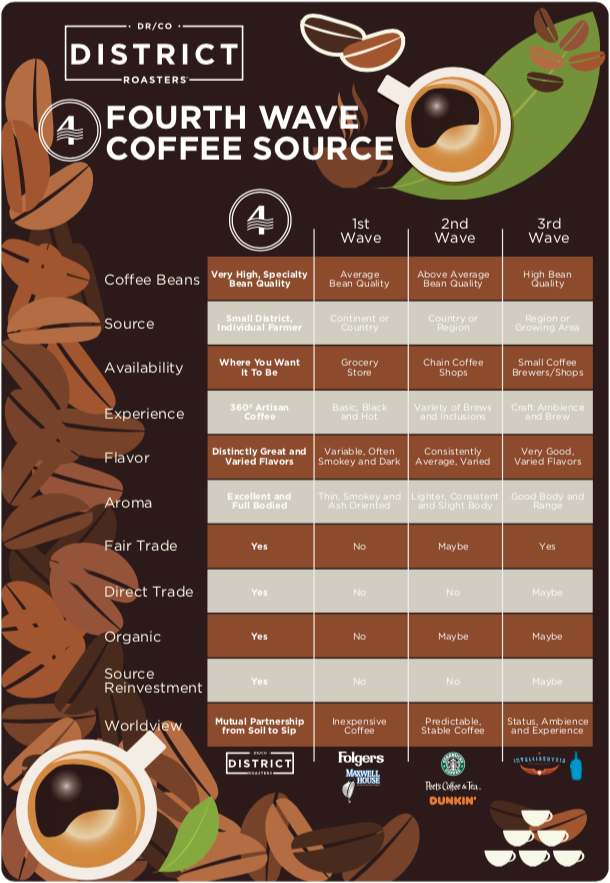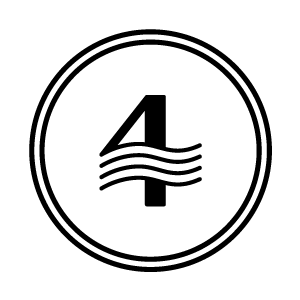Fourth Wave Coffee from DISTRICT Roasters
Historically, major shifts in the mass production and distribution of coffee products have been referred to as “waves.” These waves represent changes in things like how coffee beans are sourced, how coffee is grown and harvested, how products are packaged and transported, and even how fresh beans are treated or roasted. Fourth Wave Coffee is the latest such shift but the changes here are far more significant than any other wave we’ve seen before. Rather than mere tectonic adjustments, this is the wave that will get the whole planet to shake!
Fourth wave coffee is a marriage between stellar coffee products and truly worthwhile social consciousness. It relies on sourcing only the highest-quality beans in small batches for a truly artisanal coffee experience. The flavors are deep and distinct while the aromas will fill a room with an enticing fragrance something akin to true love. Perhaps most important, though, is the socioeconomic impact of this new wave of coffee. Fourth wave means that a coffee is a direct and fair trade, organic product with a direct reinvestment to specific farmers and their families. The fourth wave worldview is one of partnership from source to sip and back to the source.
At DISTRICT Roasters, that’s exactly what we’re all about.
How We Got Here
To truly appreciate where coffee has come, it’s important to take a step back and recognize where it’s been. Since this trend is being referred to as the fourth wave coffee movement, let’s take a look at the first three waves for perspective.

First Wave Coffee
First wave coffee has always been about making coffee convenient. Big food producers launched household brands that became widely available on grocery store shelves. Think tin can with a plastic lid. Using average quality beans from any source able to produce at scale, these companies began widely distributing pre-ground coffee by the pound. This as the stuff you might have bought once and then pushed to the back of your pantry for a surprise visit from your in-laws.
First wave coffee has always been the inexpensive, easy option for people who just want to pour grounds into a filter, press a button, and have a pot made for them each morning. There are no socioeconomic implications with first wave coffee, as the relationships between the major distributors and their sources were never more than simple business partnerships.
Second Wave Coffee
Second wave coffee is a bit more intriguing. This is the stuff you buy from the big chain coffee shops who can generally at least tell you the country where your morning brew’s beans were sourced. These options are generally a bit lighter and less smoky than first wave coffees and typically offer quite a few more options. This also introduced many new coffee and espresso drinks to the public.
During coffee’s second wave, domestic distributors began to recognize that there is some opportunity for using coffee as an agent of positive global change. Many second wave coffees are direct or fair trade. Some are organic. Some are tied to people or causes who can benefit from the sale of these products. However, that is not always the case so it’s important to do a bit of research if these factors are important to you when choosing where you’ll be purchasing your next cup of coffee.
Third Wave Coffee
Third wave coffee is another big step closer to where we are today. Third wavers look for high quality beans with a variety of tasty flavor profiles. These options tend to be available in independent coffee shops and roasters who are willing to put a special effort on sourcing delicious fair trade coffee beans. These beans are often also direct trade and organic, but that isn’t always the case.
One of the biggest dividing factors between third and fourth wave coffee is that a third wave worldview is still largely focused on the consumer. Many third wave producers position their coffees as luxury items to be enjoyed as a part of an experience. Third wave coffee drinkers are the people who speak about coffee with the same air as others may speak of fine wines or bourbons. This is where coffee really becomes a craft experience.
How DISTRICT Embraces Fourth Wave Coffee Culture
At DISTRICT, our entire mission deals with a commitment to fighting to eradicate economic, physical, and spiritual poverty around the world. Recognizing that coffee is the world’s second-largest commodity, we found a golden opportunity by becoming a fourth wave coffee roaster. Remember, there are millions of people involved in coffee farming and production in some of the world’s poorest places. Because we are committed to working directly with farmers within defined districts, fourth wave makes all the sense in the world to us.
We only offer fair trade, direct trade, organic, specialty coffee beans of the absolute highest quality. The goals is for our customers to enjoy better coffee than they ever have before. That’s why we work painstakingly to ensure that the flavor, aroma, and overall experience of each DISTRICT coffee or blend is a one-of-a-kind experience that can be rivaled only by the positive impact we make in the districts where our partners are found.
From Source to Sip to Source
Phrases like “fair trade”, “organic”, and “small batch” have become watered down marketing materials. We get that. So what makes us different? At DISTRICT, we deliver exactly what we say we will and we do so by maintaining what we call 360 degrees of integrity. From source to sip and back to source, DISTRICT is involved every step of the way to bring you unbeatable coffee that creates a tremendous impact.
If you’re ready to try fourth wave coffee for yourself, check out our coffees and blends to see exactly what we’re talking about. You’ll be glad you did.


